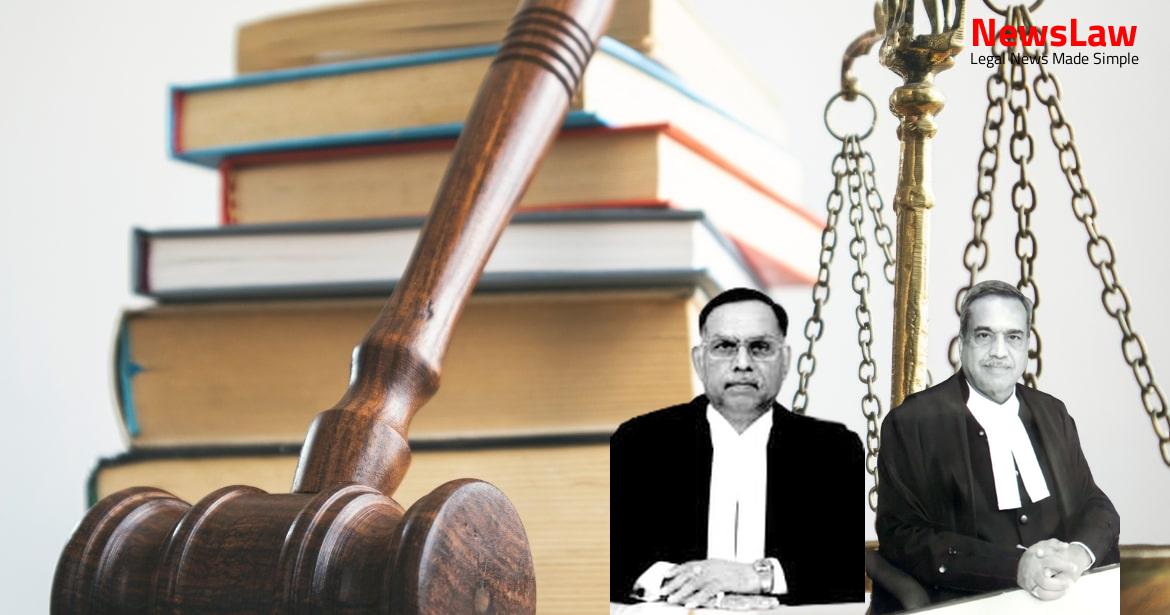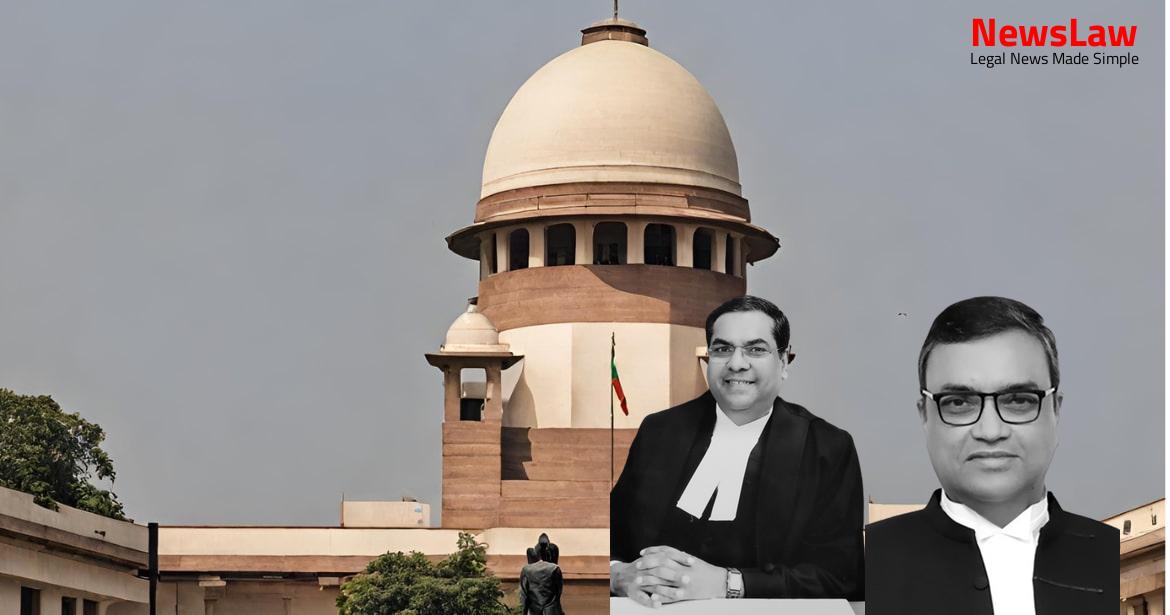Explore a detailed legal analysis of how courts address the concepts of consortium and loss of love in compensation cases. Delve into the court’s explanation of the importance of compensating for these losses and the reasoning behind setting specific figures for conventional heads like loss of consortium. Understand the complexities of awarding compensation for different types of consortium, including spousal, parental, and filial consortium. This analysis provides valuable insights into the legal framework governing compensation in cases involving personal loss and injury.
Facts
- In various cases, the High Court granted compensation for ‘loss of love and affection’ and ‘loss of consortium’ to the claimants at specified rates.
- The compensation under ‘loss of love and affection’ was granted at Rs.50,000/- per claimant in some cases, and at Rs.40,000/- per claimant in others.
- Similarly, the compensation under ‘loss of consortium’ was granted at Rs.40,000/- per claimant in multiple cases.
- The Insurance Company filed appeals in all the mentioned cases, challenging the orders of the High Court regarding the compensation granted.
- The appeals were filed based on the specific rates of compensation and enhancements granted by the High Court.
- The grant of compensation under two heads has been challenged in this appeal: Loss of love and affection and Loss of Parental Consortium.
- The notice was issued limited to the issue of whether both consortium and loss of love and affection could have been awarded by the High Court in this case.
- There is a stay on the payment of the compensation amount towards loss of love and affection pending further orders.
- Various claim petitions were filed by the respondents in different cases, and the awards granted by the Motor Accident Claims Tribunal were challenged by the Insurance Companies in appeals.
- The High Courts allowed appeals filed by the claimants, enhancing the compensation granted under the heads of loss of consortium and loss of love and affection.
- Different accidents leading to fatalities were mentioned in the cases, and the compensation amounts varied based on the specific circumstances and testimonies presented in each case.
Also Read: Transfer of Writ Petitions for Chartered Accountants’ Tax Audit Guidelines
Issue
- The issue raised in the case is whether consortium can be awarded to children and parents, in addition to just the wife.
- The question pertains to the entitlement of consortium for parties other than the wife.
- The interpretation of consortium extends beyond just the spouse and covers the possibility of children and parents being awarded consortium as well.
Also Read: Analyzing Interference with Acquittal in Legal Conviction Case
Arguments
- The appellant argues that the compensation cannot be enhanced on the appeal filed by the insurance company if the claimants have not filed an appeal.
- Referring to the Constitution Bench Judgment and the judgment of Pranay Sethi, the appellant contends that the payment under conventional heads should be limited to ‘loss of estate’, ‘loss of consortium’, and ‘funeral expenses’ with specific amounts set for each.
- The appellant disagrees with the High Court’s decision to award compensation under the head ‘loss of love and affection’ as well as ‘consortium’ to each claimant, stating that it goes against the legal principles established by previous court judgments.
- The argument focuses on the specific amounts allocated for conventional heads and disputes the High Court’s decision to further enhance compensation for ‘loss of love and affection’.
- There is a contention regarding the interpretation of ‘consortium’, with the appellant insisting that only spousal consortium was referenced in the judgment of Pranay Sethi, therefore, no other forms of consortium should be considered for compensation.
- The appellant argues that the awards granted under ‘loss of love and affection’ and ‘consortium’ are beyond the prescribed limits and should not have been extended to include children and parents.
- A further submission is made in another case, The Oriental Insurance Company Ltd. Versus Smt. Rinku Devi and others, which likely presents additional arguments or concerns.
- In the case at hand, learned counsel for the respondent supported the judgments of the High Court.
- The learned counsel for both parties relied on various judgments of the Court during their arguments.
- These judgments will be considered in detail while evaluating the submissions made by the parties.
Also Read: Judicial Review on Sentence and Compensation in Criminal Case
Analysis
- The Court emphasizes on the importance of compensating for loss of consortium and loss of love and affection under the conventional heads.
- It mentions that compensation is meant as a form of atonement for the injury caused.
- The judgment of Pranay Sethi clarifies that consortium is not payable only to the wife but can include other legal heirs if claimed.
- To bring consistency, the Court sets reasonable figures for conventional heads like loss of estate, loss of consortium, and funeral expenses at Rs. 15,000/-, Rs. 40,000/-, and Rs. 15,000/- respectively.
- The Court allows for enhancements of these amounts at the rate of 10% every three years to maintain consistency.
- Uniformity in granting consortium and loss of love and affection is deemed necessary by the Court to avoid inconsistent awards by different tribunals and High Courts.
- It concludes by suggesting that at least one lakh rupees should be awarded for loss of consortium.
- The interpretation of ‘consortium’ includes spousal, parental, and filial consortium as approved by a Three-Judge Bench.
- The concept of consortium in legal parlance entails the rights of a spouse to the company, care, help, comfort, guidance, society, solace, affection, and sexual relations with their mate.
- Loss of love and affection is considered part of the loss of consortium, encompassing the companionship, care, and protection provided by the deceased.
- Different types of consortium include spousal consortium, parental consortium, and filial consortium, each entitling different parties to compensation.
- Modern jurisdictions worldwide recognize the significant value of a child’s consortium, surpassing the economic value in case of the child’s death, leading to compensation for parents.
- The Motor Vehicles Act aims to provide relief to victims or their families through its provisions for compensation, including consortium.
- Various conventional heads under which compensation can be awarded include loss of estate, loss of consortium, and funeral expenses, with specific fixed amounts assigned for each category.
- Parental consortium is awarded to children who lose parents in motor vehicle accidents, while filial consortium grants compensation to parents in case of a child’s accidental death.
- The amount granted for loss of consortium is crucial and should be fair, reasonable, and periodically revisited to align with contemporary societal norms.
- Loss of consortium is upheld as a significant aspect for awarding compensation in various jurisdictions, emphasizing the non-pecuniary nature of the loss suffered.
- Consortium, whether spousal, parental, or filial, is recognized as a legitimate and critical component in determining compensation under the law.
- 1. The Court did not make a decision on the correctness of the amount granted under the category of ‘loss of love and affection’.
Decision
- All appeals partly allowed.
- MACT order maintained for the claimant’s appeal.
- MACT to recompute amount payable.
- Order of High Court awarding compensation for ‘loss of love and affection’ set aside.
- Directions of High Court to deposit statutory amount in AASRA fund also set aside.
Case Title: THE NEW INDIA ASSURANCE COMPANY LIMITED Vs. SOMWATI (2020 INSC 535)
Case Number: C.A. No.-003093-003093 / 2020



